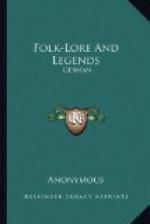The fairies, besides their equestrian processions, are addicted, it would seem, to the pleasures of the chase. A young sailor, travelling by night from Douglas, in the Isle of Man, to visit his sister residing in Kirk Merlugh, heard a noise of horses, the holloa of a huntsman, and the sound of a horn. Immediately afterwards, thirteen horsemen, dressed in green, and gallantly mounted, swept past him. Jack was so much delighted with the sport that he followed them, and enjoyed the sound of the horn for some miles, and it was not till he arrived at his sister’s house that he learned the danger which he had incurred. I must not omit to mention that these little personages are expert jockeys, and scorn to ride the little Manx ponies, though apparently well suited to their size. The exercise, therefore, falls heavily upon the English and Irish horses brought into the Isle of Man. Mr. Waldron was assured by a gentleman of Ballafletcher that he had lost three or four capital hunters by these nocturnal excursions. From the same author we learn that the fairies sometimes take more legitimate modes of procuring horses. A person of the utmost integrity informed him that, having occasion to sell a horse, he was accosted among the mountains by a little gentleman plainly dressed, who priced his horse, cheapened him, and, after some chaffering, finally purchased him. No sooner had the buyer mounted and paid the price than he sank through the earth, horse and man, to the astonishment and terror of the seller, who, experienced, however, no inconvenience from dealing with so extraordinary a purchaser.
THE DEATH “BREE.”
There was once a woman, who lived in the Camp-del-more of Strathavon, whose cattle were seized with a murrain, or some such fell disease, which ravaged the neighbourhood at the time, carrying off great numbers of them daily. All the forlorn fires and hallowed waters failed of their customary effects; and she was at length told by the wise people, whom she consulted on the occasion, that it was evidently the effect of some infernal agency, the power of which could not be destroyed by any other means than the never-failing specific—the juice of a dead head from the churchyard,—a nostrum certainly very difficult to be procured, considering that the head must needs be abstracted from the grave at the hour of midnight. Being, however, a woman of a stout heart and strong faith, native feelings of delicacy towards the sanctuary of the dead had more weight than had fear in restraining her for some time from resorting to this desperate remedy. At length, seeing that her stock would soon be annihilated by the destructive career of the disease, the wife of Camp-del-more resolved to put the experiment in practice, whatever the result might be. Accordingly, having with considerable difficulty engaged a neighbouring woman as her companion in this hazardous expedition,




